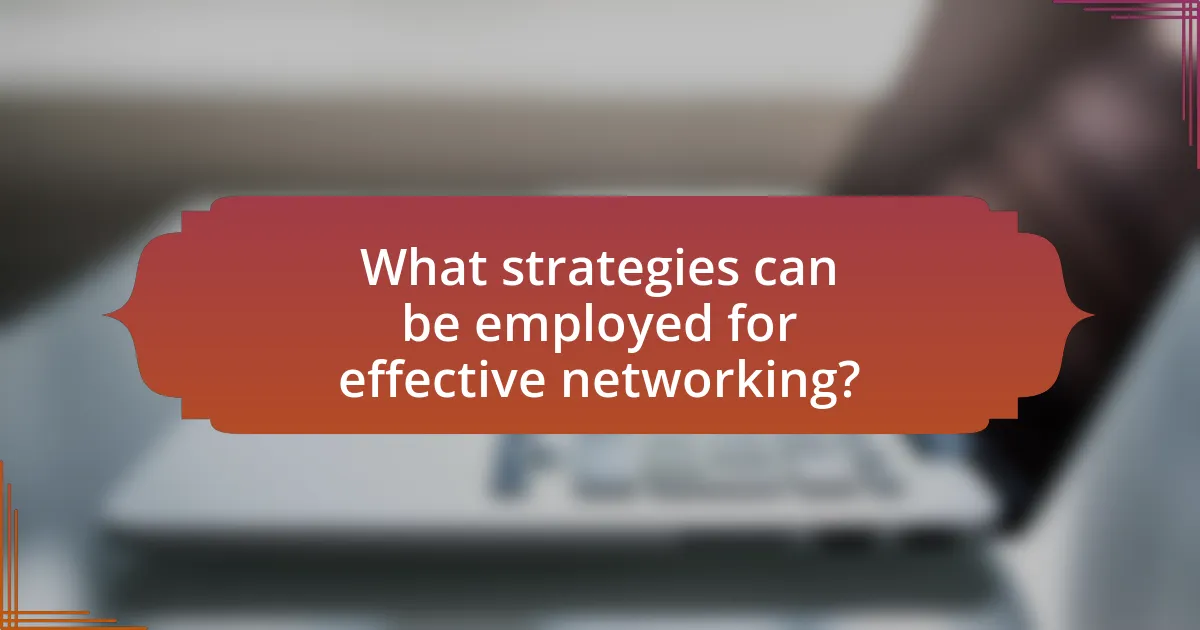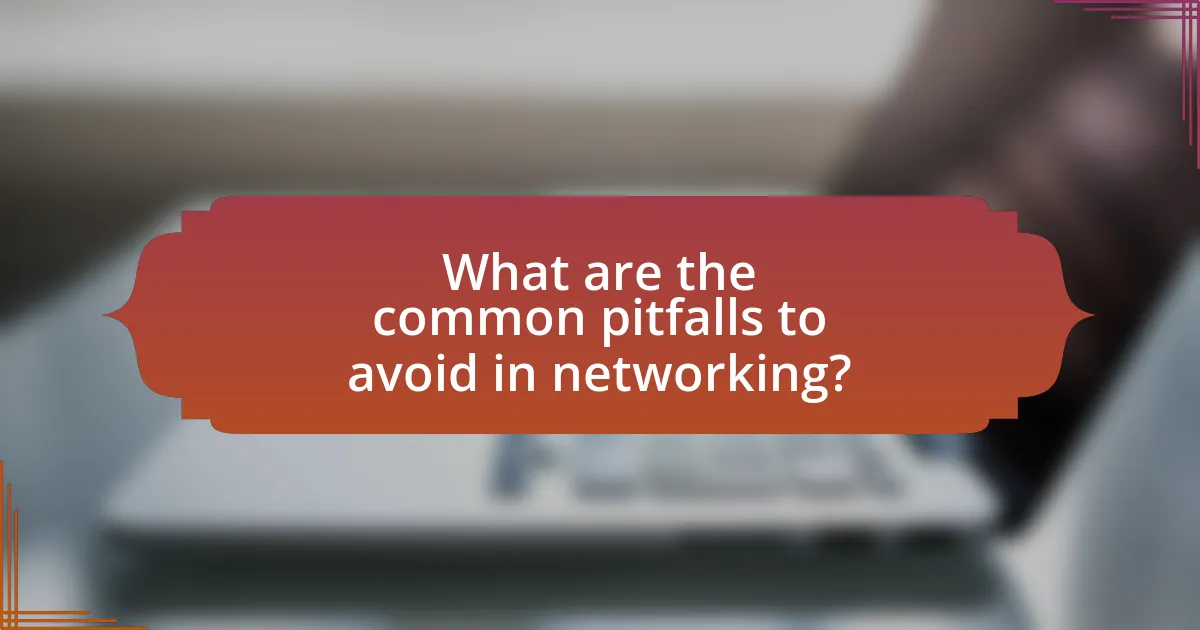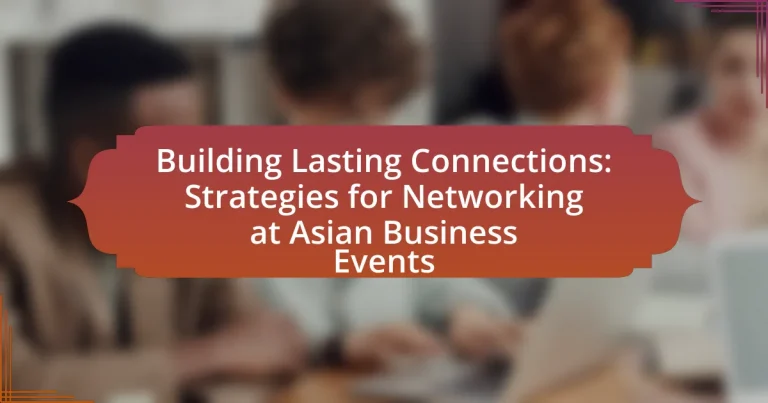The article “Building Lasting Connections: Strategies for Networking at Asian Business Events” focuses on essential networking elements such as relationship building, cultural awareness, effective communication, and follow-up strategies. It emphasizes the influence of cultural differences on networking approaches, highlighting the importance of hierarchy, respect, and patience in Asian business contexts. The article outlines practical strategies for effective networking, including preparation, active listening, and leveraging social media, while also addressing common pitfalls to avoid, such as neglecting follow-ups and over-promoting oneself. By understanding local customs and fostering genuine relationships, professionals can enhance their networking success in Asian markets.

What are the key elements of networking at Asian business events?
The key elements of networking at Asian business events include relationship building, cultural awareness, effective communication, and follow-up strategies. Relationship building is essential as it fosters trust and long-term connections, which are highly valued in many Asian cultures. Cultural awareness is crucial, as understanding local customs and business etiquette can significantly enhance interactions; for example, bowing in Japan or exchanging business cards with both hands in China demonstrates respect. Effective communication, both verbal and non-verbal, is vital for conveying messages clearly and establishing rapport. Finally, follow-up strategies, such as sending personalized messages or scheduling future meetings, are important for maintaining connections and demonstrating commitment. These elements collectively contribute to successful networking outcomes in Asian business contexts.
How do cultural differences influence networking strategies?
Cultural differences significantly influence networking strategies by shaping communication styles, relationship-building approaches, and expectations in professional interactions. For instance, in many Asian cultures, building trust and rapport is essential before engaging in business discussions, which contrasts with more direct networking styles prevalent in Western cultures. Research by the Harvard Business Review highlights that in collectivist societies, such as those in Asia, networking often relies on personal connections and group affiliations, making it crucial to invest time in relationship development. This understanding of cultural nuances allows professionals to tailor their networking strategies effectively, enhancing their ability to forge meaningful connections in diverse business environments.
What specific cultural norms should be considered when networking in Asia?
When networking in Asia, it is crucial to consider the importance of hierarchy and respect in interpersonal relationships. In many Asian cultures, such as those in Japan, China, and Korea, seniority and status significantly influence business interactions. For instance, addressing individuals by their titles and surnames demonstrates respect and acknowledges their position. Additionally, non-verbal communication, such as maintaining eye contact and using appropriate body language, is essential, as it conveys sincerity and attentiveness.
Furthermore, building relationships often requires patience, as trust is developed over time rather than through immediate transactions. This cultural norm is supported by the concept of “guanxi” in China, which emphasizes the significance of personal connections in business dealings. Understanding these norms can enhance networking effectiveness and foster lasting professional relationships in Asia.
How can understanding local customs enhance networking opportunities?
Understanding local customs enhances networking opportunities by fostering trust and rapport among participants. When individuals demonstrate knowledge of cultural practices, such as greetings, gift-giving, or dining etiquette, they signal respect and appreciation for the local culture. This respect can lead to more meaningful interactions, as studies show that cultural awareness significantly improves relationship-building in business contexts. For instance, a survey by the Harvard Business Review found that professionals who engage with local customs are perceived as more credible and likable, which directly correlates with increased networking success.
What role does relationship building play in networking?
Relationship building is essential in networking as it fosters trust and collaboration among individuals. Strong relationships enhance communication, leading to more meaningful exchanges of information and opportunities. Research indicates that 70% of jobs are found through networking, highlighting the importance of personal connections in career advancement. Furthermore, effective relationship building can result in long-term partnerships, referrals, and support, which are critical for success in business environments, particularly in Asian markets where personal relationships often influence professional interactions.
Why is trust important in Asian business cultures?
Trust is crucial in Asian business cultures because it forms the foundation for long-term relationships and successful partnerships. In many Asian societies, business transactions are often built on personal relationships rather than solely on contracts or formal agreements. This reliance on trust fosters loyalty and encourages collaboration, which are essential for navigating the complexities of business in these regions. For instance, a study by the Asian Development Bank highlights that trust significantly influences business performance and negotiation outcomes in Asian markets, demonstrating its vital role in facilitating effective communication and mutual understanding among partners.
How can one effectively build rapport with potential contacts?
To effectively build rapport with potential contacts, one should actively listen and engage in meaningful conversations. Active listening demonstrates genuine interest, which fosters trust and connection. For instance, studies show that people are more likely to feel valued and understood when their conversational partner reflects on their thoughts and feelings, leading to stronger interpersonal relationships. Additionally, sharing relevant personal experiences can create common ground, enhancing the sense of connection.

What strategies can be employed for effective networking?
Effective networking strategies include actively engaging in conversations, leveraging social media platforms, and attending industry-specific events. Engaging in conversations allows individuals to establish rapport and share insights, which fosters meaningful connections. Utilizing social media platforms, such as LinkedIn, enables professionals to expand their reach and maintain relationships over time. Attending industry-specific events provides opportunities to meet like-minded individuals and exchange valuable information. Research indicates that 85% of jobs are filled through networking, highlighting the importance of these strategies in building professional relationships.
How can preparation enhance networking success?
Preparation enhances networking success by equipping individuals with the knowledge and skills necessary to engage effectively with others. When individuals research attendees, understand industry trends, and develop clear objectives for their networking efforts, they can initiate meaningful conversations and establish rapport more easily. A study by the Harvard Business Review found that professionals who prepare for networking events are 70% more likely to make valuable connections compared to those who do not prepare. This preparation allows individuals to tailor their approach, ask relevant questions, and demonstrate genuine interest, ultimately leading to stronger and more productive relationships.
What are the best practices for researching attendees before an event?
The best practices for researching attendees before an event include utilizing social media platforms, analyzing attendee lists, and leveraging professional networking sites. Social media platforms like LinkedIn provide insights into attendees’ professional backgrounds, interests, and connections, which can help tailor networking strategies. Analyzing attendee lists allows event organizers to identify key participants and their affiliations, enabling targeted outreach. Additionally, leveraging professional networking sites can facilitate pre-event introductions and discussions, fostering connections before the event begins. These practices enhance the effectiveness of networking efforts and contribute to building lasting connections.
How should one prepare an elevator pitch for networking?
To prepare an elevator pitch for networking, one should focus on crafting a concise and engaging summary of their professional background, skills, and goals, ideally within 30 to 60 seconds. This involves identifying key points that highlight unique value propositions, such as specific achievements or expertise relevant to the audience. Research indicates that effective elevator pitches should include a hook to capture attention, a clear statement of what one does, and a call to action, which can lead to further conversation or connection opportunities. According to a study by the Harvard Business Review, pitches that are structured and tailored to the listener’s interests significantly increase the likelihood of a positive response.
What techniques can facilitate meaningful conversations?
Active listening is a key technique that can facilitate meaningful conversations. This involves fully concentrating, understanding, responding, and remembering what the other person is saying, which fosters a deeper connection and encourages openness. Research indicates that active listening can improve interpersonal relationships and enhance communication effectiveness, as demonstrated in studies by researchers like Brown and McDonald, who found that individuals who practice active listening report higher satisfaction in their conversations. Additionally, asking open-ended questions encourages participants to share more about their thoughts and feelings, further enriching the dialogue.
How can active listening improve networking outcomes?
Active listening significantly enhances networking outcomes by fostering deeper connections and trust among participants. When individuals engage in active listening, they demonstrate genuine interest in others’ perspectives, which encourages open communication and rapport-building. Research indicates that effective listening can lead to improved relationship quality, as it allows for better understanding of needs and interests, ultimately facilitating more meaningful exchanges. For instance, a study published in the Journal of Business Communication found that active listening skills correlate positively with relationship satisfaction in professional settings, highlighting its importance in networking contexts.
What questions can spark engaging discussions during events?
Questions that can spark engaging discussions during events include inquiries about personal experiences, industry trends, and cultural insights. For example, asking “What has been your most rewarding experience in your career?” encourages participants to share meaningful stories, fostering deeper connections. Additionally, questions like “How do you see our industry evolving in the next five years?” stimulate dialogue about future trends, allowing attendees to exchange valuable insights. Furthermore, inquiries such as “What cultural practices do you find most impactful in business?” promote discussions about cultural diversity, which is particularly relevant in Asian business contexts. These types of questions not only engage participants but also create opportunities for networking and collaboration.

What are the common pitfalls to avoid in networking?
Common pitfalls to avoid in networking include failing to follow up, being overly self-promotional, and neglecting to listen actively. Failing to follow up can lead to missed opportunities; research indicates that 80% of sales require five follow-ups after the initial contact. Being overly self-promotional can alienate potential connections, as effective networking is built on mutual benefit and relationship-building. Neglecting to listen actively can hinder meaningful conversations, as studies show that active listening improves relationship quality and trust.
What mistakes do people often make when networking at business events?
People often make several mistakes when networking at business events, including failing to prepare adequately, not following up after initial meetings, and focusing too much on selling rather than building relationships. Preparation is crucial; individuals who do not research attendees or the event miss opportunities to engage meaningfully. A study by the Harvard Business Review highlights that 70% of networking success comes from follow-up, yet many neglect this step, leading to lost connections. Additionally, prioritizing sales pitches over genuine conversations can alienate potential contacts, as effective networking relies on establishing trust and rapport rather than immediate transactions.
How can over-promoting oneself hinder networking efforts?
Over-promoting oneself can hinder networking efforts by creating a perception of insincerity and self-centeredness. When individuals excessively highlight their achievements or capabilities, it can alienate potential connections who may view them as lacking humility or genuine interest in others. Research indicates that effective networking relies on mutual benefit and relationship-building, which can be undermined by a focus on self-promotion. For instance, a study published in the Journal of Business and Psychology found that individuals who engage in excessive self-promotion are often perceived as less trustworthy, leading to reduced opportunities for collaboration and connection.
What are the consequences of neglecting follow-up communications?
Neglecting follow-up communications can lead to weakened relationships and missed opportunities. When individuals fail to follow up after networking events, they risk being forgotten by their contacts, which diminishes the likelihood of future collaborations or partnerships. Research indicates that 80% of sales require five follow-ups after the initial meeting, highlighting the importance of consistent communication in maintaining connections. Additionally, neglecting follow-ups can result in a lack of trust and professionalism, as it may signal disinterest or uncommitment to the relationship. This can ultimately hinder personal and professional growth within networking contexts, particularly in competitive environments like Asian business events.
What practical tips can enhance networking effectiveness?
To enhance networking effectiveness, individuals should prioritize building genuine relationships by actively listening and engaging in meaningful conversations. Research indicates that effective networking is not merely about exchanging business cards but rather about establishing trust and rapport, which can lead to long-term professional connections. For instance, a study published in the Journal of Business and Psychology found that networking quality, characterized by the depth of interactions, significantly correlates with career advancement and opportunities. Therefore, focusing on authentic engagement and follow-up communication can substantially improve networking outcomes.
How can one leverage social media for networking at events?
One can leverage social media for networking at events by actively engaging with event-related content and participants on platforms like LinkedIn, Twitter, and Facebook. By using event hashtags, individuals can join conversations, share insights, and connect with other attendees, which enhances visibility and fosters relationships. Research indicates that 79% of marketers say that user-generated content on social media has a significant impact on their brand engagement, highlighting the effectiveness of social media interactions in building connections.
What are the benefits of joining local business associations for networking?
Joining local business associations for networking provides access to a diverse pool of contacts, resources, and opportunities that can enhance business growth. These associations often host events, workshops, and seminars that facilitate direct interactions among members, fostering relationships that can lead to collaborations, partnerships, and referrals. Research indicates that 70% of jobs are found through networking, highlighting the importance of building connections within local business communities. Additionally, members benefit from shared knowledge and best practices, which can lead to improved business strategies and increased visibility in the market.




